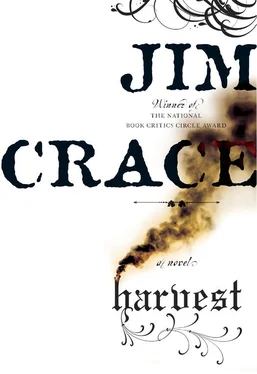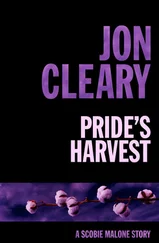I clear away the carpeting of straw to find bare tiles and stretch the calfskin on the scullery floor. Now I can see the puckering where that little hand-reared animal, which was so moist and succulent for us at our gleaning feast, was cut along the spine, peeled off the ribs and then spread out for butchering. Her twin flanks are still joined at the girth, along an uneven ridge of skin. They provide for Mr. Quill an amply proportioned square, almost a good reach in length along each side. I arm myself with a blunt-edged knife and kneel down, holding the saturated skin firmly under both knees while I scrape away from me with my good hand. The knife dislodges any waste, any nuds of lime or tags of veal, but I have to snap out hairs at their bulbs with my fingers. The skin is not yet leathery. I should say vellumy. It’s far too coarse still, and resistant. I should have soaked it for a week or more. I have to limber it. I will not say it’s easy work. I will not say I enjoy being this intimate with an animal I’ve known and liked (and eaten, actually). But I see the task as a test. It can stand as proof to Mr. Quill that should he ever need a manservant then none can do a better job than me. So I try my best not to complain. I concentrate on smooth and thin and uniform. I am determined I will pass the lighted candle test.
At such close quarters, the smell is nauseous. What flesh has not been loosened and washed away in the soaking has begun to putrefy. I have to sit back every little while to breathe less heavy air. Stand up too quickly and I’ll faint. But slowly I can feel the calfskin surrendering to my hand. It’s thinning and it’s softening. I do not think the vellum I produce will be the finest quality. It’s not sufficiently prepared. I’m rushing it. I have no practice or proficiency. I’ve made mistakes. I doubt that it was wise to dry the skin in the smoke of its own roasting flesh. I’m not even certain if I should have steeped the skin with lime and dung. Till now, there’s not been any call for vellum hereabouts. Mr. Quill, though, does not seem dissatisfied when he steps across the room to view my progress and test it with his thumb. Evidently my surface is very nearly fibrous enough to hold yet not absorb his inks and paints.
Mr. Quill is working on his preliminary sketches. He is experimenting, hoping to discover what colored patterns he can devise to make the story of our farmscape — and our sheepscape — easy to decipher. It sounds to me, from my position on the floor, as if he’s doing women’s work. His tools are cutlery and grinding blocks, and pestle dishes hardly larger than a shell. I half expect to smell the spice of cake. Nutmeg, at least. But all I get above the rot of veal are the cloying odors of his binding gum and lye. He is clearly content in my company, speaking freely now, not whispering. It doesn’t matter if he’s overheard by any of the Jordan men. He’s only talking processes, informing me, but also reminding himself, of each step in his recipes for color. He uses words I’ve rarely heard before — like lapis lazuli and smalt . They are somehow related to the emerging blues that are already in evidence on his fingertips — and across his cheeks and in his tapered beard. I am supposed to see the difference — although the light is low in here — between the florey and the litmus and the indigo, which he displays for me on little parchment tags. He is as snug and personal with his kitchen colors as I have learned to be with clouds, let’s say, or even with the sky’s own wash. I have my blues: this blue betokens harvest days (it will not rain), and that one promises a cracking frost; another — higher, darker and more ponderous — reveals itself only silently and briefly when the sun has already withdrawn into his bedchamber but the windows of his heavens are not yet quite closed; this is the blue that says we’re free to stretch and finish work and rest.
So our afternoon progresses cozily, drawn on by the prospect of our owlish rendezvous tonight. There is a touch of winter in the room, not in its chill but in its busyness — and that is comforting. What I will miss the most, now that Cecily is gone, now that I myself am tempted to depart, are those still and icy, cloud-weighted times in the dead season, when, if I were fool enough to step outside my cottage into the cold and moonless dark, all I could expect to see would be the ducking of my neighbors’ candle flames and all that I could expect to hear, other than the cracking of the frost beneath my feet, would be the industry of far-from-summer tools. This is for us the mending time and the fixing season: boys carve their spoons from yew or plug the leaks in mugs and jugs; their dads replace the handles on their scythes and sickles, or fashion willow tines to renew the teeth in forks and rakes; their wives and daughters make new clothes or darn the old. Every home is embering before its fires in concentrated silence, and getting ready for the coming year.
And in our house, my wife and I set to work on the reeds and withies I gathered in the autumn, making trays and baskets for anyone that asked and could provide us with a ham, let’s say, or a honey pot by way of exchange. Such evenings were our most tender and consoling, no matter that the spring was far away and all we had to eat was barley bannock bread and broth, every day a Friday with no meat. So here, in Mr. Quill’s attentive company, I hear those busy sounds again. So long as I do not look up across the scullery, I am lost in lost and happy times.
For a while, the encounters and discoveries of this morning are almost forgotten in the engrossments of our work. Our talk is soft and intimate. Mr. Quill has the grace to show an interest in my story. Here is my chance to say how, now that Cecily is dead, I am eager for a change. A change and an adventure. “And not one that involves a single day of shepherding,” I add. “Though making vellum is a pleasing craft.” He nods while I am speaking. He takes my meaning, I believe. His nodding gives me reason to suppose he will discuss the matter with his host. “And you, sir?” I ask Mr. Quill. “Are there adventures calling you?”
His story is a shorter one. He has never been in love. He has no wife to widow him, and both his parents are deceased. His eldest brother has their property: the family home, a warehouse and a riverboat for trade and carriage of anything from fish to cloth. But Mr. Quill is not a wealthy man, he says, “not in possessions, not in my body … as you see. This left side is wooden from the shoulder to the ribs. A sudden palsy. Something in the bones. When I was a child.”
“So not an accident?” I mean to ask him if he was struck by lightning or injured by a bucking horse, as I overheard him say to Master Jordan last afternoon.
“That was my schoolroom jest, my regular defense against …” he starts to say, but shakes his head. He evidently does not want to mention lightning again. “No matter, though. I have been raised to understand I am unfit to work out of doors and too great an encumbrance to be employed within. I cannot help my brother in his warehouse or his boat. What use am I? In such a clumsy state, I cannot even find myself a wife. I take my happiness from this …” He indicates the paints and sketches on his desk. “Step forward, Walter. See how my colors have ennobled all my marks.”
While I’ve been working vellum from the skin, Mr. Quill has turned his scratchy charts and drawings into something odd and beautiful. There is no lettering as yet. Just shapes and lines and coloring. I recognize their intrigue and their sorcery. I’ve seen equally compound patterns, no less ineffable than these, when I’ve peeled back bark on dying trees, or torn away the papering on birches. I’ve seen them sketched by lichens on a standing stone, or designed by mosses in a quag, or lurking on the underwing of butterflies. I’ve found these ordinary abstracts in the least expected places hereabouts: I have only to lift a stone, or turn some fallen timber in the wood, or reverse a leaf. The structures and the ornaments revealed are made purposeful simply by being found. But none of these compare for patterned vividness with Mr. Quill’s designs. His endeavors are tidier and more wildly colorful — they’re certainly more blue — than anything that nature can provide. They’re rewarding in themselves. They are more pleasing than a barleycorn. “This one,” he says, “is, here and now, my true account. It’s what you have before Edmund Jordan the Younger brings in his improvements—”
Читать дальше












